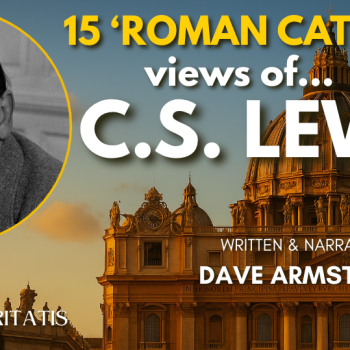
He sat by a roadside he knew well but had never seen. For he had been born blind. He heard a group of men passing, and one asked whether his blindness was because of his parents' sin or his own. He heard a gentle but strong and confident voice reply that no one had sinned, that his presence had something to do with the "the works of God." The gentle voice was firm: "As long as I am in the world, I am the light of the world." He had no experience with light, but he realized that the light of this man would change his life. He had no way to know that it would change the world and everyone who would choose to see it.
Vistas and vision.
This witness and his parents looked out on the world and into their lives differently. Jewish leaders questioned the parents, hoping they would discredit their son or the "prophet" he praised for his sight. These leaders wanted to "cast" someone out of the synagogue, and the parents were not able to see beyond religious and social disadvantages they might suffer. They had no desire to see the new worlds opening to their son. The son was rejoicing in light, nature, and the faces of loved ones. He wanted to thank the prophet, though he did not know where to find Him. The parents were to see only what they feared would damage them.
Infusion of spiritual light.
To see can be an awe-inspiring adventure. Worldwide Christian leader Dieter F. Uchtdorf, as a professional airline pilot, loved to see vistas which brought deep spiritual as well as aesthetic meaning into his life. Reflecting on scientific development, he wrote:
Scientists were struggling to understand the breadth of the universe until instruments became sophisticated enough to gather in greater light so they could understand a more complete truth. . . And with that greater light, mankind was introduced to glorious vistas we had never before imagined.
He continued,
If you seek God’s truth, that which now may appear dim, out of focus, and distant will gradually be revealed and clarified and become close to your heart by the light of God’s grace. Glorious spiritual vistas, unimaginable to the human eye, will be revealed to you.
Another respected leader of Christians throughout the world, Jeffrey R. Holland, looked at the expression "light at the end of the tunnel," affirming that it exists as the "Light of the World, the Bright and Morning Star, the 'light that is endless, that can never be darkened' . . . the very Son of God Himself."2 Refusing the light of the sun or of the Son can bring a lot of darkness.
The witness experienced these infusions of light and spiritual understanding when he was found by the Savior, who revealed who He was. People like his parents may refuse to see for various reasons.
Denial of accurate light.
In our 21st Century world, fear and embarrassment still limit or distort people's vision. Many people with mental health difficulties choose not to see and represent their condition accurately because they are afraid that the stigma they suffer will increase.
The American Psychiatric Association mentions three kinds of stigma that may cause them to hide from the public and even from themselves: (a) public stigma, common negative attitudes; (b) self-stigma, "internalized shame"; and (c) institutional stigma, neglect and discrimination by government and private organizations.3 No one wants to be sent away from the synagogue—or anywhere else.
Overload.
The man born blind who was healed by the Savior entered a world of wonder for him, which many 21st Century folk would consider very simple and possibly easy to control with good sight. Many of us have our sight damaged by the opposite problem. Too many images continually invading our mental space can make it difficult for 7-day Christians (among many others) to get through to what we really want and need to see. Even when we view some images very briefly, our minds can hang on to them and bring them back when we most need our brains to see or do something else.
Internet images.
On the all-seeing and all-arrogant internet, the practical utilitarian Dictionary.com includes (on a good day) unwanted images hawking prestigious banks, newest computers, breakfast cereals, cough-sore throat medicines, hydrating hair treatment, various games and puzzles, and a special edition silver dollar with an image many of us don't want. It's difficult to see and harder to remember the words you need. How can one focus on how to spell "perspicacity" when images of sweeter breakfast options block our vision?
Ordering a gift online for a grandchild invites a mind-boggling collection of images. If you are able to see the gift you want, it may be pulled off the screen and replaced by garish irrelevant images as you try to complete the order request. The more specific you can make your request, the fewer images you have to see. For example, "sleeping bags" will bring images of bags for all ages, all uses, all prices, all cautions etc. If you limit to "light weight sleeping bags for home use by young children," the image onslaught is reduced.
When shopping, remember that the label "must have" attaches to an inestimable number and variety of images. We don't have to believe we "must have" everything image makers press us to see and carry in our minds if we don't want or can't afford them.
Finally, we have been told there is a "dark internet," which neither of us has tried or will try. The name says "it" all.
Selective searching.
The man who receive his sight from the Savior worshipped the Savior as soon as his eyes' understanding was opened to who the Savior was. His overwhelming vision became selective. As 21st Century 7-day Christians, we should be selective in the images we want in our minds, avoiding those we don't want appearing in front of our eyes long afterward.
Some good Christian websites are available: Christianity.com is one of them. Just put "Christianity" into your browser to see a number of sites. You may want your congregation or denomination website where you can easily get into it, along with websites of other denominations with materials that interest you. Look for offerings compatible with your interests and standards. Ask friends for recommendations.
If you are interested in visual arts but want to control the number or nature of images you may have to see, The Web Gallery of Art is helpful. This website was designed for teachers and students, combining a virtual museum and an easy-to-search database. You enter terms and key stuff to find items you want or to locate articles on events, places, persons, other museums, and some churches.
If you love music, you probably have creators and performers along with specific titles for searching. Music is an auditory medium, but popular music videos integrate music with visuals representing song lyrics, portrayed themes, etc. Memory associations joining music and images are powerful. Catalogues or reviews may preview images you would not want floating in your mind—perhaps interminably.
Blindness?
A comment by18th Century blind-deaf pioneer Helen Keller is often quoted: “The only thing worse than being blind is having sight but no vision.” Helen Keller had true vision, as her incredible life and accomplishments show.
People who are blind in the 21st Century have particular blessings for spiritual, mental, and emotional sight. New kinds of sight and light enable new ways. A woman who lost her sight at age 30 quickly enrolled in a school for the blind. She learned to read Braille, so verbal pictures and caricatures were available to her along with the physical book-learning she still craved. She loved learning to cook; her favorite accomplishment was finding varied ways to indulge her passion for chocolate. She volunteered to help train dogs to aid the blind.
Despite physically dysfunctional EYEsight, this lady had a rich and satisfying life, highlighted by love for and absolute trust in Jesus Christ.
12/28/2022 6:59:11 PM





